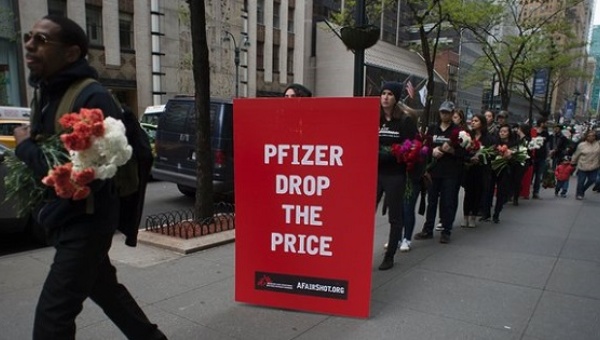MSF Refused a Million Free Vaccines to Stand up to Big Pharma
HEALTH, 24 Oct 2016
teleSUR – TRANSCEND Media Service
While Pfizer made $6.245 billion in revenue last year, 1.4 million children die each year from the pneumonia strain.
16 Oct 2016 – Doctors Without Borders said last week it had refused a donation of one million pneumonia vaccinations from the drug manufacturer Pfizer as part of a principled stand against Big Pharma‘s monopolistic drug-pricing policies.
RELATED: Big Pharma Hikes Price of Life-Saving Devices by 400%
While Pfizer raked in US$6.245 billion in revenue last year, 1.4 million children continue to die from the disease every year.
Pfizer’s vaccine for pneumonia is known as PCV-13. Since its introduction in the United States six years ago, cases of severe Strep pneumonia in that country have declined by 88 percent. But pneumonia deaths remain commonplace in sub-Saharan Africa and southeast Asia, where the award-winning Doctors Without Borders — known outside the U.S. as Médecins Sans Frontières (MSF) — ply their trade.
But Pfizer’s vaccine is expensive and protected by multiple patents, on both the final product and also on the process by which the vaccine is made. Last year the South Korean company SK Chemicals was close to producing a similar vaccine but Pfizer sued the company with the support of the intellectual Property Tribunal.
“Pfizer is committed to making vaccines available to as many people as possible,” company spokesperson Sally Beatty told The Atlantic by email, “particularly those needing emergency humanitarian assistance.”
httpv://www.youtube.com/watch?v=VUHHSIWziuk
Beatty explained that Pfizer “strongly disagrees” with MSF’s decision, and that “to suggest that donations are not valuable defies logic.”
MSF has been wanting access to PCV-13 since 2009 when it was first introduced, but the group has lacked the resources to purchase it.
Jason Cone, the executive director of Doctors Without Borders in the United States, says the cost is the most fundamental issue. He explained that donations from pharmaceutical companies are only a short-term solution, that would actually be dire in the long term.
RELATED: Refugee Baby Born on MSF Rescue Ship in Mediterranean
“(Donations) are often used as a way to make others ‘pay up.’ By giving the pneumonia vaccine away for free, pharmaceutical corporations can use this as justification for why prices remain high for others, including other humanitarian organizations and developing countries that also can’t afford the vaccine,” he said.
“I’m not absolutely against donations,” MSF’s vaccine pharmacist Alain Alsahani told The Atlantic. “In cases of neglected disease where there is little or no market for a product,” he explained, “donation becomes a more interesting option for some countries to get access. But in the case of PCV, that’s not a solution at all, in any way.”
When The Atlantic probed Pfizer about making the vaccine affordable to humanitarian organizations like MSF, Beatty wrote, “We are actively exploring a number of new options to enable greater access to our pneumococcal vaccine … to aid NGOs facing humanitarian emergency settings.”
Other vaccines are also controlled by monopolies and duopolies. Both the HPV and the rotavirus vaccine against diarrhea are made only by GSK and Merck, while the new malaria vaccine is only made by GSK.
Go to Original – telesurtv.net
DISCLAIMER: The statements, views and opinions expressed in pieces republished here are solely those of the authors and do not necessarily represent those of TMS. In accordance with title 17 U.S.C. section 107, this material is distributed without profit to those who have expressed a prior interest in receiving the included information for research and educational purposes. TMS has no affiliation whatsoever with the originator of this article nor is TMS endorsed or sponsored by the originator. “GO TO ORIGINAL” links are provided as a convenience to our readers and allow for verification of authenticity. However, as originating pages are often updated by their originating host sites, the versions posted may not match the versions our readers view when clicking the “GO TO ORIGINAL” links. This site contains copyrighted material the use of which has not always been specifically authorized by the copyright owner. We are making such material available in our efforts to advance understanding of environmental, political, human rights, economic, democracy, scientific, and social justice issues, etc. We believe this constitutes a ‘fair use’ of any such copyrighted material as provided for in section 107 of the US Copyright Law. In accordance with Title 17 U.S.C. Section 107, the material on this site is distributed without profit to those who have expressed a prior interest in receiving the included information for research and educational purposes. For more information go to: http://www.law.cornell.edu/uscode/17/107.shtml. If you wish to use copyrighted material from this site for purposes of your own that go beyond ‘fair use’, you must obtain permission from the copyright owner.
